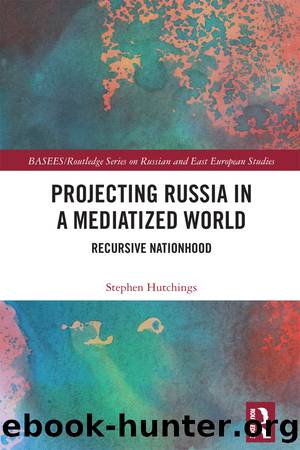Projecting Russia in a Mediatized World by Stephen Hutchings

Author:Stephen Hutchings [Hutchings, Stephen]
Language: eng
Format: epub
Tags: Social Science, Ethnic Studies, American, Asian American Studies, Regional Studies
ISBN: 9781000538212
Google: glxVEAAAQBAJ
Publisher: Routledge
Published: 2022-01-31T04:17:54+00:00
The Russian state, nonetheless, increasingly requires cinema to endorse official patriotism. In 2016, the Ministry of Culture named eight patriotic storylines it considered worthy of funding, one of multiple such directives over the past decade (Child 2016). Putin is in a line of Kremlin occupants to have recognized cinemaâs effectiveness as a tool of persuasion, beginning with Leninâs 1922 dictum that âof all the arts, cinema is the most importantâ, a refrain reprised by Stalin, Khrushchev, and Brezhnev. Filmâs nation-building role exploits the suitability of its audiovisual mode and populist reach to the large-scale projection of national fantasies and myths. But cinema has always been more thoroughly traversed by transnational flows â economic, aesthetic, and cultural â than other mass entertainment forms. As Andrew Higson argues, âthe paradox is that for a cinema to be nationally popular it must also be international in scope ⦠it must achieve the international standardâ (Higson 1989: 40). Canonic, Stalin-era films, produced at the height of Soviet isolationism, were heavily influenced by Hollywood (including Aleksandrovâs legendary escapist musicals). In the era of accelerating global connectivity into which post-Soviet Russia was born, international film markets, products, and audiences converge with domestic ones. The plethora of cross-national co-productions â one index of this convergence â include Mikhalkovâs paean to tsarist culture, The Barber of Siberia (Sibirskii tsiriulnik 1997) but also art-house masterpieces like Sokurovâs Moloch (Molokh 1999), co-produced with a Berlin-based company, which provided Russiaâs Oscar entry (Bergfelder 2000). This further complicates the national deployment of cinema for cultural diplomatic purposes â and not for Russia alone â by ceding some control to the partner nation, whilst attracting new audiences (Leontyeva and Bezenkova 2016).
Download
This site does not store any files on its server. We only index and link to content provided by other sites. Please contact the content providers to delete copyright contents if any and email us, we'll remove relevant links or contents immediately.
Cecilia; Or, Memoirs of an Heiress — Volume 1 by Fanny Burney(32544)
Cecilia; Or, Memoirs of an Heiress — Volume 2 by Fanny Burney(31942)
Cecilia; Or, Memoirs of an Heiress — Volume 3 by Fanny Burney(31928)
The Great Music City by Andrea Baker(31915)
We're Going to Need More Wine by Gabrielle Union(19033)
All the Missing Girls by Megan Miranda(15942)
Pimp by Iceberg Slim(14481)
Bombshells: Glamour Girls of a Lifetime by Sullivan Steve(14050)
For the Love of Europe by Rick Steves(13894)
Talking to Strangers by Malcolm Gladwell(13345)
Norse Mythology by Gaiman Neil(13344)
Fifty Shades Freed by E L James(13231)
Mindhunter: Inside the FBI's Elite Serial Crime Unit by John E. Douglas & Mark Olshaker(9317)
Crazy Rich Asians by Kevin Kwan(9275)
The Lost Art of Listening by Michael P. Nichols(7488)
Enlightenment Now: The Case for Reason, Science, Humanism, and Progress by Steven Pinker(7306)
The Four Agreements by Don Miguel Ruiz(6744)
Bad Blood by John Carreyrou(6610)
Weapons of Math Destruction by Cathy O'Neil(6264)
